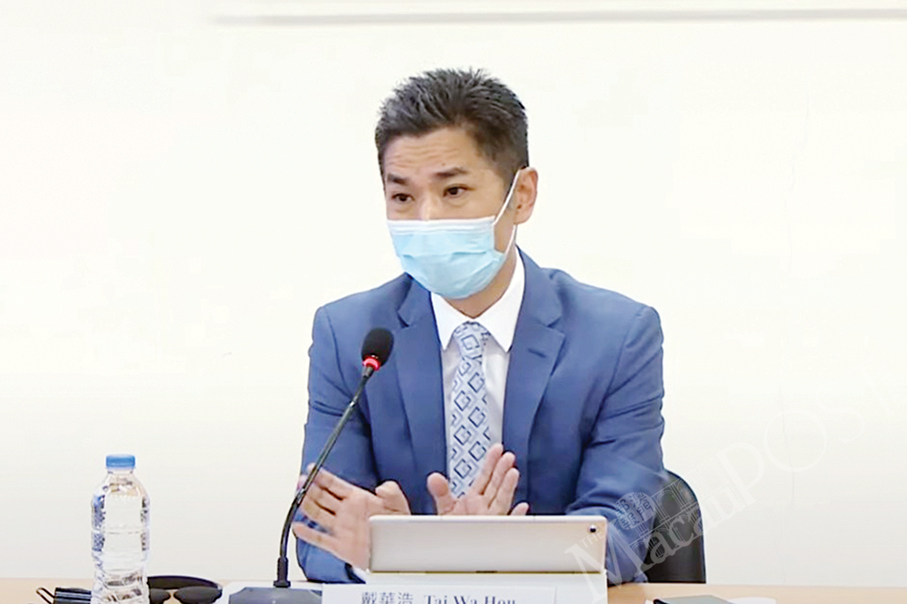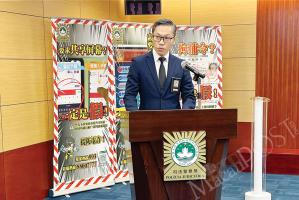2021-09-21 03:37 Comment:0
Tony Wong
Addressing yesterday’s press conference about Macau’s novel coronavirus situation, Tai Wa Hou, a clinical director of the public Conde de São Januário Hospital Centre, said that as of 4 p.m. yesterday the Health Bureau (SSM) had issued 609 people with a doctor’s certificate confirming that they are unable to be vaccinated against COVID-19 due to certain health reasons, 190 of whom are pregnant woman, since the bureau announced its new COVID-19 vaccination measure early last week.
The new measure requires all those who have not been inoculated against the novel coronavirus to be tested for COVID-19 regularly if they need to meet service users in their job or work with their colleagues in indoor workplaces.
The Health Bureau (SSM) published new guidelines on Monday last week on COVID-19 vaccinations and nucleic acid testing (NAT) for “all staff members” in the city, according to which all those in contact with service users during their work, or all those who work with their colleagues in indoor workplaces, will have to be tested for COVID-19 once every week, or even more frequently, if they have not been inoculated against the novel coronavirus.
The new measure announced by the Health Bureau on Monday last week will cover almost the entire working population in the city, regardless of whether working in the public or the private sectors, except for very few groups of people such as freelancers. The required frequency of the nucleic acid tests for those who have not been inoculated against COVID-19 will depend on their respective occupations. All the respective public or private entities will have to draw up their own specific rules that enable them to implement the new measure that is required by the “principled” guidelines published by the Health Bureau on Monday last week.
Jab or test
The Public Administration and Civil Service Bureau (SAFP) announced on Tuesday last week that it will start implementing the new jab-or-test measure for public servants on September 27, according to which all public servants must either display a COVID-19 vaccination record, or present a NAT certificate confirming that they have been tested for the novel coronavirus within the past seven days, when entering their respective workplace. Public servants who are unable to go to work due to their failure to display the inoculation record or the negative NAT result will face disciplinary proceedings for “unexcused absence from work”.
The SAFP announcement on Tuesday last week said that only those who hold a doctor’s certificate confirming that they are unable to get vaccinated against COVID-19 due to certain health reasons can have their NAT cost exempted, i.e., public servants who choose not be inoculated without a health reason will have to pay for the regular COVID-19 tests themselves. A nucleic acid test costs 80 patacas.
The Health Bureau published another set of guidelines on Wednesday last week, according to which those who need to obtain an officially-recognised doctor’s certificate confirming their unsuitability for COVID-19 vaccinations must make an inoculation appointment at one of the city’s vaccination facilities first. They can only get such a certificate at the vaccination facility after being assessed by a doctor there as being unsuitable for COVID-19 vaccinations.
The Public Administration and Civil Service Bureau, which is tasked with managing the government’s public servants, is so far the only public entity that has announced specific rules so as to get the new vaccination-or-test measure off the ground.
‘Absolute’ contraindications
During yesterday’s press conference, Tai also noted that the only “absolute” contraindication to COVID-19 vaccine is an anaphylactic reaction, i.e., the potential vaccinee’s acute allergy to the vaccine or any ingredient of the vaccine, which involves symptoms such as acute generalised hives, throat or tongue swelling, and shortness of breath. “People with this absolute contraindication are unable to have any further COVID-19 jabs permanently,” Tai said.
Tai underlined that a slight skin allergy (such as a few rashes) and an allergy to a certain medicine or material are not contraindications to COVID-19 vaccine. “Even though a person has a serious allergy to a certain medicine or material, there’s no problem for them to have a COVID-19 jab if they clearly know that they are only allergic to a certain medicine or material,” Tai said.
Tai said that those who do not know which medicine or material they are allergic to need to see a dermatologist first for an assessment. In this case, Tai said, the person is able to get vaccinated against COVID-19 as long as the dermatologist concludes that they do not have an allergy to COVID-19 vaccine or any ingredient in the vaccine.
Tai said that those who have come down with a slight skin allergy after receiving their first COVID-19 jab are able to have their second jab.
According to Wiktionary, anaphylaxis – also known as anaphylactic shock or reaction – is an extreme sensitivity to a substance such as a foreign protein or drug, or a severe and rapid systemic allergic reaction to an allergen, causing a constriction of the trachea, preventing breathing.
Tai said that’s why anyone who has been vaccinated against COVID-19 must stay put at the inoculation facility for at least 30 minutes, as normally people who could have an anaphylactic reaction will come down with the symptoms within 30 minutes of getting the jab.
‘Very rare’ anaphylactic shock
Tai urged those who have received a COVID-19 jab not to leave the inoculation facility during the 30-minute observation period, where various kinds of first-aid equipment, including cardiopulmonary resuscitation devices, are ready in case a COVID-19 vaccinee comes down with an anaphylactic shock. Tai warned that the development of an anaphylactic reaction could be fatal within a very short time.
Tai noted that despite the fact that the probability of an anaphylactic reaction after being given a COVID-19 jab is very rare – one case per one million Sinopharm doses and up to six cases per one million BioNTech doses, it would be “a very big incident” if an anaphylactic shock occurs. Tai said that no anaphylactic reaction has been reported so far in Macau where around 650,000 doses of COVID-19 vaccine have been administered.
As of 4 p.m. yesterday, 649,564 doses of COVID-19 vaccine had been administered to 348,347 people in Macau, comprising 45,087 who had received their first jab and 303,260 who had received their second jab.
Macau’s COVID-19 vaccination rate stood at 51 percent as of 4 p.m. yesterday – i.e., 51 percent of the population had received at least one jab. According to the latest demographic statistics, Macau’s population stood at 682,500 at the end of June.
A total of 24 adverse events were reported in the past 24 hours (until 4 p.m. yesterday). The total number of adverse events since the start of the vaccination drive stood at 2,773, or 0.43 percent of the total number of jabs, including eight serious cases.

Tai Wa Hou, a clinical director of the public Conde de São Januário Hospital Centre, addresses yesterday’s press conference about the city’s COVID-19 situation. Photo: GCS
 Macau to host 4 competitive, 1 mass sports events for 15th National Games
Macau to host 4 competitive, 1 mass sports events for 15th National Games
 Macau, HK, Guangdong finetuning deal on joint emergency response in GBA: Macau fire chief
Macau, HK, Guangdong finetuning deal on joint emergency response in GBA: Macau fire chief
 Local victim of ‘fake police scam’ rescued by Macau cops in Mexico: PJ chief
Local victim of ‘fake police scam’ rescued by Macau cops in Mexico: PJ chief